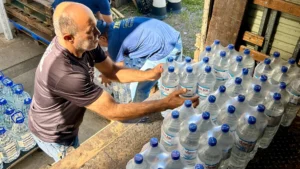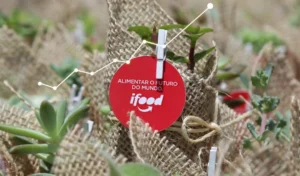Aware of its environmental responsibility, iFood created iFood Regenera, a goal plan that has, among its objectives, recycling plastic and reducing the emission of polluting gases.
Therefore, see iFood Regenera's goals and how iFood intends to achieve them:
What is iFood Regenera?
iFood Regenera is a set of the platform's environmental plans, supported by some sustainability goals.
To achieve this, the company will invest in innovation, research and development to become a reference in delivery operations without environmental impact.
Furthermore, iFood will support recycling cooperatives across the country, with investments in qualification, structure and machinery improvements.
What is the goal of iFood Regenera?
iFood Regenera has two major goals: to end plastic pollution from its delivery operations and to become carbon neutral by 2025, hoping that at least 50% of its deliveries will be made in non-polluting modes.
To achieve this objective, iFood has several initiatives, including investment in sustainable vehicles, such as bicycles and electric motorcycles.
Furthermore, we are working on the development of sustainable packaging and recycling cooperatives to expand their production capacity and improve the income of members.
How does iFood Regenera work?
Based on the goals set by iFood Regenera, the platform defines some partnerships and investment in innovations.
Finally, check out some of iFood’s solutions:
Avoid using plastic
The first step is to present solutions in the app to encourage consumers to have more sustainable habits. Therefore, we offer customers the choice not to receive plastic cutlery and other disposable items.
Initial testing shows that 90% of consumers have used the feature.
Furthermore, in the app, the company created a seal to recognize the good environmental practices of restaurants registered with iFood.
“These initiatives contribute to reducing the consumption of plastic items, which are often sent unsolicited and end up being thrown away unused. In the first tests we carried out, 90% of consumers used the resource, which resulted in the reduction of tens of thousands of cutlery and shows the user's desire to receive less waste in their homes”, explains the executive.
Reuse plastic that already works
iFood Regenera also intends to focus efforts on developing and promoting packaging made from raw materials from renewable sources, such as paper, for example.
“We want to transform the entire plastic-free packaging supply chain in Brazil. Promoting the national chain, from production to marketing and logistics, thus offering a competitive price to industries that already exist but do not have the scale of production and demand”, comments the executive.
Thus, innovation and investment in recycling cooperatives in the country will be central to achieving the company's commitment goals.
Therefore, investments are planned to improve the structures and machinery of cooperatives. Furthermore, iFood will invest in the construction of a new semi-mechanized sorting center in São Paulo.
The new center will have the potential to increase recycling rates in the city and increase the income of cooperative members.
Reusing plastic: discover Já Fui Bag
The project 'I've Been Bag' consists of reverse logistic and correct disposal of thermal backpacks used by delivery people.
“Since 2019, we have correctly disposed of more than 80 tons of these materials, in a “zero landfill” project model. Even though they are difficult to recycle materials, the bags still find new uses as market bags. Some of these bags are already being used in delivery orders, replacing plastic bags in markets in São Paulo”, informs Vitti.
iFood Regenera and CO2 reduction
Through the iFood Regenera program, the company will measure, reduce and neutralize all food emissions Greenhouse gases (GHG) of your business.
The first step was to rely on the expertise of Moss.Earth, a carbon market technology company, which developed the GHG inventory.
The document, whose base year is 2020, covers emission scopes 1, 2 and 3, that is, it also includes emissions from all deliveries of orders made last year.
In total, 128 thousand tons of CO2 were emitted, and these emissions will be neutralized through investment in environmental preservation and reforestation. The initiative is, therefore, a pioneer in the delivery sector in Brazil.
Partnership with non-polluting modes
For 50% of orders to be delivered in non-polluting modes by 2025, another important partnership is with the automaker Voltz, a company specializing in electric motorcycles.
The pilot project, which will begin in April, will feature 30 electric motorcycles that will be tested by delivery drivers and, after this period, the expectation is to reach more than 10 thousand motorcycles in the next 12 months.
To encourage the use of the modal, iFood is developing partnerships to create a special line of credit for delivery partners.
“We know that compensation alone is not enough. It is necessary to think of innovative ways to reduce CO2 emissions. In October last year, we launched iFood Pedal, in partnership with Tembici, a project developed exclusively for delivery drivers that offers affordable plans for renting electric bikes. Currently, more than 2,000 couriers are registered and share 1,000 electric bikes in São Paulo and Rio de Janeiro, in addition to the educational nature of the initiative. With the good adherence indicators, our plan is to gradually expand the project, taking it to other cities and, thus, increasing our percentage of clean deliveries”, highlights the executive.
iFood Regenera: change starts at home
In addition to creating several initiatives that positively impact society, iFood is also “looking at home”.
The company's offices now make rational use of resources, reusing water and will have cleaner energy sources.
It is also planned to create a green roof at the iFood headquarters in Osasco to distribute to surrounding communities. The garden's production capacity can reach around 1 ton monthly.
“We know we have a long way to go, but we trust that together with important partners and this set of initiatives, in addition to others that are under development, it will be possible to improve the scenario of plastic generation and the impact of CO2 on the environment. Our relevance and presence in the lives of Brazilian families further reinforces the importance of these environmental commitments for the planet”, concludes Vitti.
Do you know what non-polluting modes are? Discover 6 used by iFood


